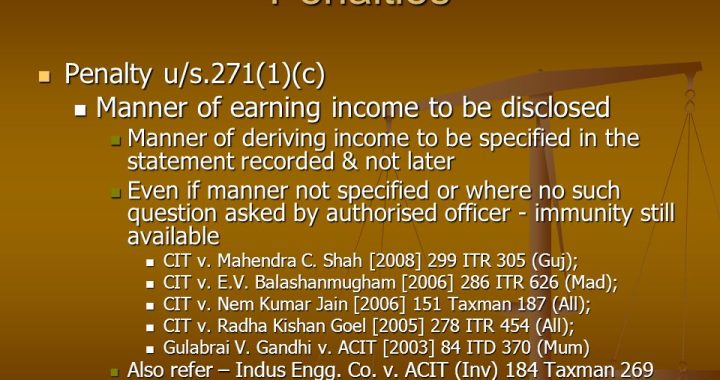Foreseeable Business loss can be allowed as deduction
 The Income Tax Tribunal, Mumbai in the case of Jacobs Engineering India Pvt. Ltd. vs. The ACIT 8(2), Mumbai, ITA No. 335IMUM of 2007 (A.Y. 2002-03) held that foreseeable losses as claimed by the assessee can be allowed as business expenditure while computing total income. The contention of the assessee to allow foreseeable business loss as expenditure was accepted.
The Income Tax Tribunal, Mumbai in the case of Jacobs Engineering India Pvt. Ltd. vs. The ACIT 8(2), Mumbai, ITA No. 335IMUM of 2007 (A.Y. 2002-03) held that foreseeable losses as claimed by the assessee can be allowed as business expenditure while computing total income. The contention of the assessee to allow foreseeable business loss as expenditure was accepted.
Brief facts of the case:
The assessee was a company involved in the business of consulting engineers dealing with chemicals, fertilizers, cement, etc. The assessee followed a percentage completion method as per AS-7 issued by the Institute of Chartered Accountants of India for accounting of revenues and expenditure.
The assessee charged to the foreseeable loss for an incomplete contract method as per AS-7. At the time of tax audit, the Assessing Officer disallowed the deduction for foreseeable loss on the ground that the said provision does not represent actual loss and the assessee was entitled for the present liability and not for any future liability. The Assessing Officer relied on the judgment of the Hon’ble Supreme Court in Tuticorin Alkali Chemicals & Fertilizers Ltd. The Commissioner of Income Tax (Appeals) confirmed the order of Assessing Officer and held that any anticipated loss cannot be allowed at the time of computing the income tax.
The assessee preferred an appeal against the aforesaid order before the Income Tax Tribunal, Mumbai.
Grounds of appeal:
The counsel for the assessee contended that according to the facts of the case, the learned Commissioner of Income Tax (Appeals) has erred in confirming the disallowance of the foreseeable losses amounting to Rs. 18, 73,568 by the Assessing Officer. It was prayed that the Assessing Officer be directed to allow the foreseeable losses and to grant deduction of the said expenditure.
Main issue appearing before the Tribunal:
The issue before the tribunal was that whether the foreseeable loss determined according to the AS-7 can be allowed as deduction while determining the taxable income.
The judgment:
After carefully perusing and carefully considering the submissions of both the sides and after going through the facts of the case and documents and after considering the case laws relied upon by both the sides regarding the issue of allow ability of foreseeable losses the Hon’ble Tribunal held that Business expenditure as stated in profit and loss account should be presumed to be genuine if the same is not challenged, as such the contention of the assessee in connection with the allow ability of foreseeable loss can be accepted in principle.
It was further directed to provide reasonable and just opportunity to the assessee for calculation and quantification of the foreseeable losses.
The appeal filed by the assessee was allowed.
Deduction can be allowed only on net income:
However it was declared that deduction under Chapter VI A can be allowed only on the net income but not on the gross income. The net income has to be calculated after keeping in mind the provisions laid down in sections 80AB, 32, 70, 71 & 72 of the Income Tax Act. As such, an assessee can rightly claim deduction as per Chapter VIA of the Act after determining the eligible profit, as provided in section 28 to 44 and after considering the provisions of section 32, 70, 71 and 72 of the Act.
The issue was however restored to the file of AO for quantification and computation of the said loss as per Accounting Standard -7 as it was not done. It was held that the assessee can claim deduction under section 80 HHE of the Act, after taking into consideration the brought forward depreciation and brought forward loss. As such, the assessee can avail deduction under section 80 HHE of the Act on the net income.

 Tax Officials Unleash Digital Dragnet: How New Raid Powers Redefine Privacy, Property Rights in India and likely to Fuel Corruption
Tax Officials Unleash Digital Dragnet: How New Raid Powers Redefine Privacy, Property Rights in India and likely to Fuel Corruption  Income Tax Department Rewards for Reporting Tax Evasion: A Comprehensive Guide
Income Tax Department Rewards for Reporting Tax Evasion: A Comprehensive Guide  Forfeiture of Gratuity by Employer- What are the Remedies for an employee- Can employer be challenged?
Forfeiture of Gratuity by Employer- What are the Remedies for an employee- Can employer be challenged?  Employer can forfeit gratuity of an employee in case of moral turpitude
Employer can forfeit gratuity of an employee in case of moral turpitude  Diving Deeper: The Impact of the New Tax Bill on Dairy and Farming Income
Diving Deeper: The Impact of the New Tax Bill on Dairy and Farming Income  Bombay High Court Upholds Section 271(1)(c) Penalty for Deliberate Non-Disclosure
Bombay High Court Upholds Section 271(1)(c) Penalty for Deliberate Non-Disclosure